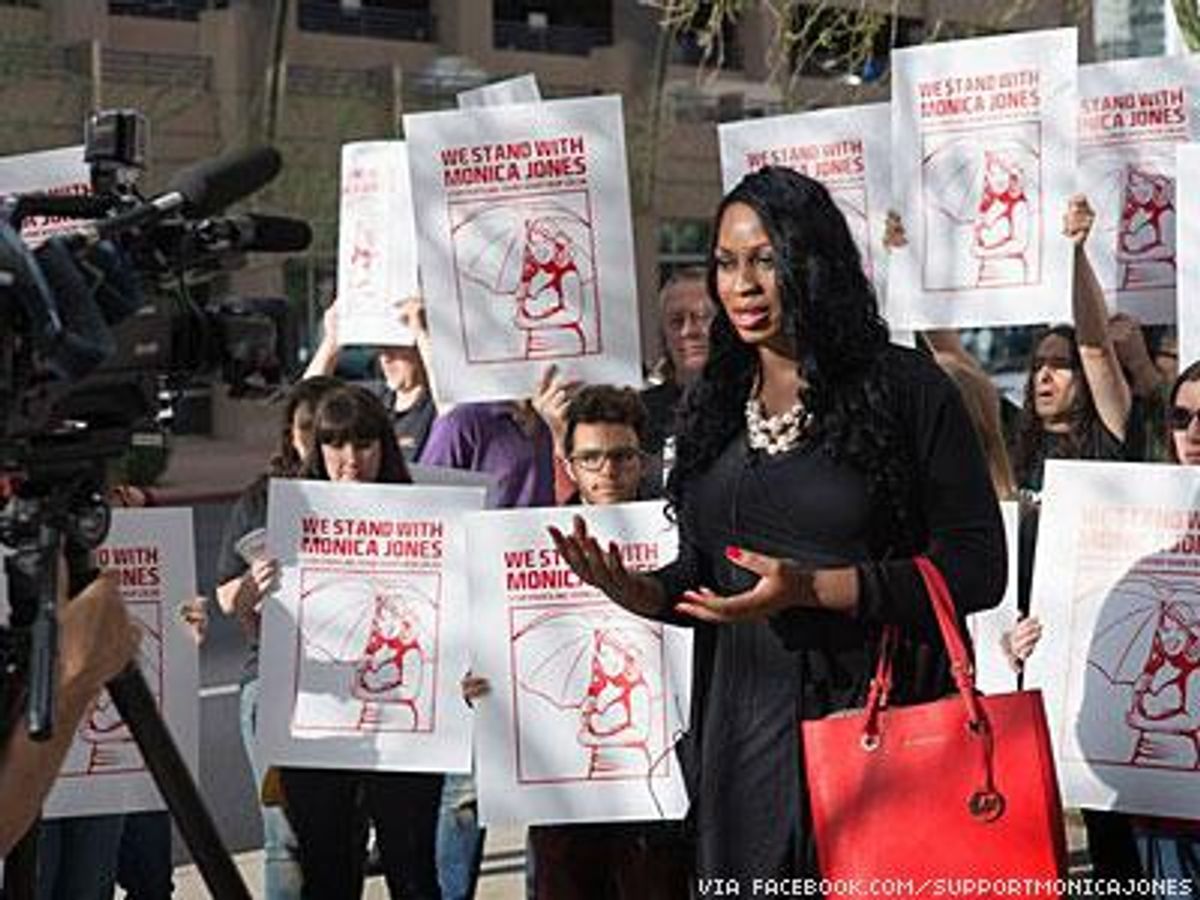A transgender woman and advocate for the rights of sex workers in Arizona has been convicted of "manifesting prostitution" after she accepted a ride from an undercover police officer in an antiprostitution sting in Phoenix last May.
Monica Jones is not a sex worker. She is a student at Arizona State University, a black transgender woman, and an advocate for sex workers who volunteers her time with the Sex Workers Outreach Project in Phoenix. But according to local law, Jones's behavior -- walking down the street and engaging others in conversation -- is criminal. Jones was convicted of "manifesting prostitution"Friday by a Phoenix judge, reports The Arizona Republic. Jones pleaded not guilty and said she intends to appeal the decision.
In Phoenix it is illegal to repeatedly engage a passerby in conversation while walking down the street. According to city law, that behavior an indication of one's intent to "manifest prostitution," and anyone who does so is subject to arrest. That same law also deems waving at cars in an attempt to stop them, asking someone if they are a police officer, or attempting to touch someone's genitals as evidence of intent to engage in prostitution, according to the Republic.
The American Civil Liberties Union, which joined Jones in her defense, contends that the law is overly broad and blatantly unconstitutional. The vague language in the statute encourages arresting officers to engage in profiling, contends the human rights organization, with a particularly powerful impact on transgender women of color, who are often unfairly characterized as sex workers.
The ACLU notes that repeatedly engaging passersby in conversation could just as easily be indicative of being lost and seeking directions, or working for a political canvassing organization.
"The difference between 'innocent' and 'criminal' behavior often comes down to how a person looks," writes the ACLU on its website. "Transgender women of color are often profiled by police as engaging in sex work for simply being outside and going about their daily routines. Amnesty International documented this disproportionate targeting by police of transgender women as sex workers in a 2005 report. '[S]ubjective and prejudiced perceptions of transgender women as sex workers often play a significant role in officers' decisions to stop and arrest transgender women,' the report concluded."
The disproportionate rate at which transgender women, especially those who are also women of color, tend to be profiled as sex workers or others with criminal intent has led to a phenomenon known among advocates as "walking while trans." In an interview with the ACLU, Jones explained how the term came into being and why it's an accurate descriptor for the charges under which she was prosecuted.
"'Walking while trans' is a saying we use in the trans community to refer to the excessive harassment and targeting that we as trans people experience on a daily basis," said Jones. "'Walking while trans' is a way to talk about the overlapping biases against trans people -- trans women specifically -- and against sex workers. It's a known experience in our community of being routinely and regularly harassed and facing the threat of violence or arrest because we are trans and therefore often assumed to be sex workers."
Just a day before her arrest last May, Jones participated in a demonstration protesting the Phoenix ordinance and a city-sponsored program that purportedly aims to help sex workers find alternative employment, but which detractors say results in increased incarceration among sex workers, known as Project ROSE.
In conjunction with the department of social work at Arizona State University, Catholic Charities, and the Phoenix Police Department, Project ROSE is a "prostitution-diversion" program that uses police stings -- both online and in the street -- to arrest alleged sex workers, then offer them an alternative to incarceration if they agree to enter a pre-sanctioned multiweek program that offers the the workers temporary housing and health services while they are engaged in it. But Project ROSE reports just a 28 percent success rate, meaning more than 70 percent of those who agree to participate in the program "fail" out of it, at which point they are placed in jail and prosecuted.
Jones, an active member of Sex Workers Outreach Project, which opposes the criminalization of sex work, says the program only serves to further criminalize sex work and take advantage of those often disadvantaged workers.
According to a Huffington Post report from Darby Hicky, those alleged sex workers arrested in Phoenix sting operations conducted under Project ROSE are brought to a church, where they are interviewed by police and prosecutors, but are not allowed to speak with defense attorneys. In an effort to "help victims," Project ROSE all but demands those arrested plead guilty by joining the program, then promptly places them in jail if they fail to meet attendance requirements, which 70 percent do, according to Hicky.
Since Jones was arrested last May, she told the ACLU, she has been harassed by police officers and questioned in relation to suspected prostitution activities four separate times: once while Jones was walking to the grocery store, another time when she was on her way to a local bar, and once while chatting with a friend on the sidewalk. Jones said officers have threatened her with the "manifestation with intent to prostitute" charge while she was on her way to a neighborhood bar.
But Jones isn't taking last week's conviction lying down. She plans to appeal the decision and is supported in that effort by the ACLU and a growing number of sex work advocates, immigrants' rights groups, and trans actress and advocate Laverne Cox, who called for greater awareness of the plight of Jones and women like her during her speech accepting the Stephen F. Kolzak award at Saturday's GLAAD Media Awards in Los Angeles.



















































































Here's our dream all-queer cast for 'The White Lotus' season 4